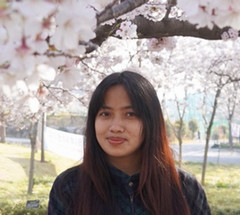Anisha Shakya
Assistant Professor

- Email:
- anishakya@unm.edu
- Office:
- Clark Hall 232
- Lab Website
Research Area/s:
Chemical Biology and Biochemistry
Research Interests:
- Biophysics
- Biochemistry
- Cell Biology
- Chemical Biology
Education
B.S., Microbiology, 2007, Tribhuvan University, Kathmandu, Nepal
B.S., Chemistry, 2010, McNeese State University, LA
Ph.D. Chemistry, 2016, University of Michigan-Ann Arbor, MI
Research
In the Shakya lab, we seek to understand how the multitude of biochemical processes occurring inside a cell are organized in absence of lipid membranes, and how the mis-regulation of such membraneless organization lead to diseases. The concept of membraneless condensate formation is helping us explain how among the billions of proteins/RNA molecules in the cell binding partners with a shared function can efficiently colocalize. This concept also presents a potential alternative for combating diseases by designing drugs that target emergent properties of condensates instead of the protein/RNA molecules themselves. This has generated a lot of excitement in disease biology and biomedicine such as neurodegenerative disease and cancer research. To be successful in both understanding disease mechanisms and targeting biological condensates, we need a deeper understanding of condensate properties and function. Our lab aims to provide a foundational framework for condensate formation and stability based on protein native structure and nucleic acid structural features, which can be generally applied to understanding partitioning and concentration of proteins and nucleic acids into various nuclear/cytoplasmic condensates in normal or diseased cellular states. To achieve this, we employ a range of interdisciplinary skills such as thermodynamic analysis, database mining and computation, super-resolution and high-throughput imaging, along with in-vitro reconstitution assays and cell biological techniques.
Selected Publications
Neha Rana, Rukhillo Kodirov, John T. King*, Anisha Shakya*, “Protein Unfolding Thermodynamics Predict Multicomponent Phase Behavior”, (2023) bioRxiv doi: https://doi.org/10.1101/2023.05.26.542380
John T. King*, Anisha Shakya*, “Modern Optical Microscopy Methods to Study Biomolecular Condensates”, Curr. Opin. Colloid Interface Sci. (2021), 52, 101421.
John T. King*, Anisha Shakya*, “Phase Separation of DNA: From Past to Present”, Biophysical J. (2021), 120, 1139.
Anisha Shakya, Martin Girard, John T. King, Monica Olvera de la Cruz, “Role of Chain Flexibility in Asymmetric Polyelectrolyte Complexation in Salt Solutions”, Macromolecules (2020), 53, 1258.
Anisha Shakya*#, Seonyoung Park#, Neha Rana, John T. King*, “Liquid-Liquid Phase Separation of Histone Proteins in Cells: Role in Chromatin Organization”, Biophysical J. (2020), 118, 753.
Anisha Shakya, John T. King, “DNA Local-Flexibility-Dependent Assembly of Phase-Separated Liquid Droplets”, Biophysical J. (2018), 115, 1840
Anisha Shakya, John T. King, “Non-Fickian Molecular Transport in Protein-DNA droplets”, ACS Macro Lett. (2018), 7, 1220.
